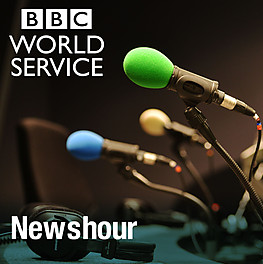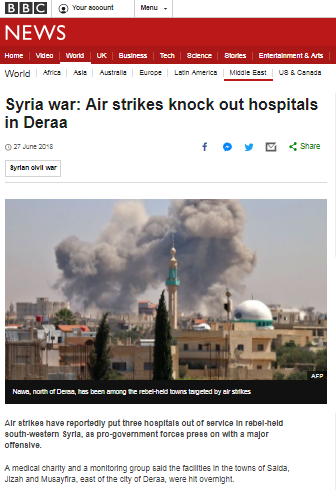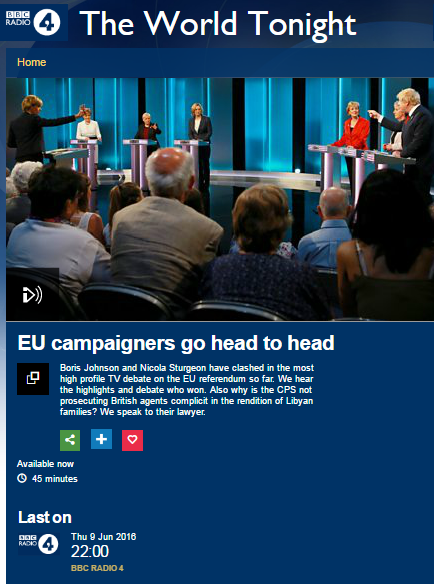As regular readers will be aware, the BBC’s coverage of the US administration’s announcement on January 16th that it would be withholding part of its donation to the UN Relief and Works Agency (UNRWA) has been extensive.
BBC News report on UNRWA funding story omits relevant background
BBC WS Newsday coverage of UNRWA aid story – part one
BBC WS Newsday coverage of UNRWA aid story – part two
Falsehoods go uncontested on BBC World Service – part one
Falsehoods go uncontested on BBC World Service – part two
Three BBC articles on US aid promote an irrelevant false comparison
BBC’s Yolande Knell amplifies UNRWA’s PR campaign
However, the BBC’s reports have consistently failed to provide its funding public with information concerning the multiple issues that have made UNRWA so controversial or conduct any in-depth examination of the agency’s purpose, its agenda, its record or its efficiency.
UNRWA’s commissioner-general, Pierre Krahenbuhl, recently visited London – according to the Guardian, in order “to brief Foreign Office minister Alistair Burt”. As the Guardian’s report shows, one of the main talking points in Krahenbuhl’s efforts to solicit donations to his organisation is the claim that cuts to UNRWA’s services are liable to increase radicalisation.
“Pierre Krähenbühl, commissioner general of the UN Relief and Works Agency, added that cuts in support to the already impoverished and demoralised population his organisation supports – many of them victims of recent conflict – risked radicalising a new generation of young Palestinians. […]
“I have just come from the Munich security conference. At every seminar, people were asking the same question: about security and how we combat radicalisation. If you want to ask us how to avoid radicalising Palestinian youth, then it is not by cutting $300m in our funding.””
Another port of call on Krahenbuhl’s London trip was the studios of the BBC World Service – which is of course partly funded by the UK government. The February 19th evening edition of the BBC World Service radio programme ‘Newshour‘ included an item described in the synopsis as follows: 
“How will UN’s Palestinian refugee agency make up for loss in funding from the US?”
Presenter Tim Franks introduced the nearly seven-minute-long item (from 30:06 here) thus: [emphasis in italics in the original, emphasis in bold added]
Franks: “Donald Trump, you may have noticed, Tweets a lot. One of his more consequential came right at the start of the year – January the 2nd to be precise. ‘We pay the Palestinians hundreds of millions of dollars a year and get no appreciation or respect’ he Tweeted. It was a sentiment he gave voice to at the Davos Economic Forum later that month.”
Recording of Trump: “When they disrespected us a week ago by not allowing our great vice-president to see them and we give them hundreds of millions of dollars in aid and support – tremendous numbers; numbers that nobody understands. That money’s on the table. That money’s not going to them unless they sit down and negotiate peace.”
Franks: “Well the practical result of that frustration is that now the vast bulk of US funding is to be withheld from UNRWA – the UN agency set up to look after what are now 5 million Palestinian refugees in the West Bank, Gaza and across the Middle East. Pierre Krahenbuhl is the boss of UNRWA. He’s currently in London.”
Predictably Franks refrained from informing listeners that the reason there are “now 5 million Palestinian refugees” is that, unlike the UN agency which takes care of all other refugees, UNRWA does not have an active program for “local integration” of refugees where they now reside – even if they live in Palestinian controlled areas – nor “resettlement” in third countries.
Listeners then heard the following conversation:
Krahenbuhl: “The United States has been the single largest and also very predictable and generous donor over decades and in 2017 contributed 364 million [$] to UNRWA and for 2018 has announced a contribution of 60 million so it’s a difference of 300 million. And that has become effective. This 60 million were transferred to UNRWA and that is the indication that we have for this year.”
Franks: “So what are you going to have to cut as a result of that?”
Krahenbuhl: “Well first of all I’m going to mobilise other donors and we’re looking for new funding lines and so we did two things: of course on the one hand with member states and the other, we launched a global public campaign called ‘Dignity is Priceless’ to tap into a lot of sympathy and solidarity that we have witnessed following the announcement by the US and a lot of people who are prepared to come and support.”
Franks: “But are you doing what is partly behind this move by the US – or at least how President Trump has explained it – which is that it is time for other countries, other donors to play a bigger role?”
Krahenbul then raised his ‘radicalisation’ talking point.
Krahenbuhl: “I take your point about the issue of redistribution but you know I don’t have, as commissioner-general, the luxury of having reserves. The only thing that I have is to go back to the member states of the [UN] General Assembly that gave UNRWA the mandate in 1949 to say ‘this is the situation I’m faced with – we need to find solutions’. Because what is at stake is not UNRWA as an organisation. What’s at stake is access to education for 525 thousand students. You know I was just at the Munich Security Conference. You cannot go to a single corridor in the hotel that hosted that without somebody asking ‘are you concerned about further radicalisation in the Middle East?’. So having 525 thousand Palestinian students, boys and girls, who are hoping for a better future no longer having access to education is certainly not an investment in regional security.”
That talking point was not however subjected to any critical examination by Tim Franks even though it would obviously have been helpful to the BBC’s funding public – who also of course fund the UK government Foreign Office which Krahenbuhl came to “brief” – to know what evidence there is to back the idea that nearly seventy years of UNRWA activity has countered radicalisation among the people it registers as refugees.
The current head of Hamas, Ismail Haniyeh, grew up – as the BBC knows – in an UNRWA administered refugee camp and attended an UNRWA run school. Hamas’ current leader in the Gaza Strip – convicted murderer Yahya Sinwar – likewise grew up in an UNRWA refugee camp. One of Hamas’ founders – Ibrahim al-Makadmeh – spent his childhood in UNRWA’s Jabaliya camp and attended an UNRWA school, as did former Izz ad-Din al-Qassam Brigades leader Saleh Shehadeh.
Nevertheless, Tim Franks made no effort to inform ‘Newshour’ listeners of those and many other examples of members of Palestinian terror organisations who contradict Krahenbuhl’s claim that an UNRWA education is “an investment in regional security”.
The rest of Franks’ interview with UNRWA’s commissioner-general will be discussed in part two of this post.




